Trends and attitudes among adherents of left-wing ideologies around the world
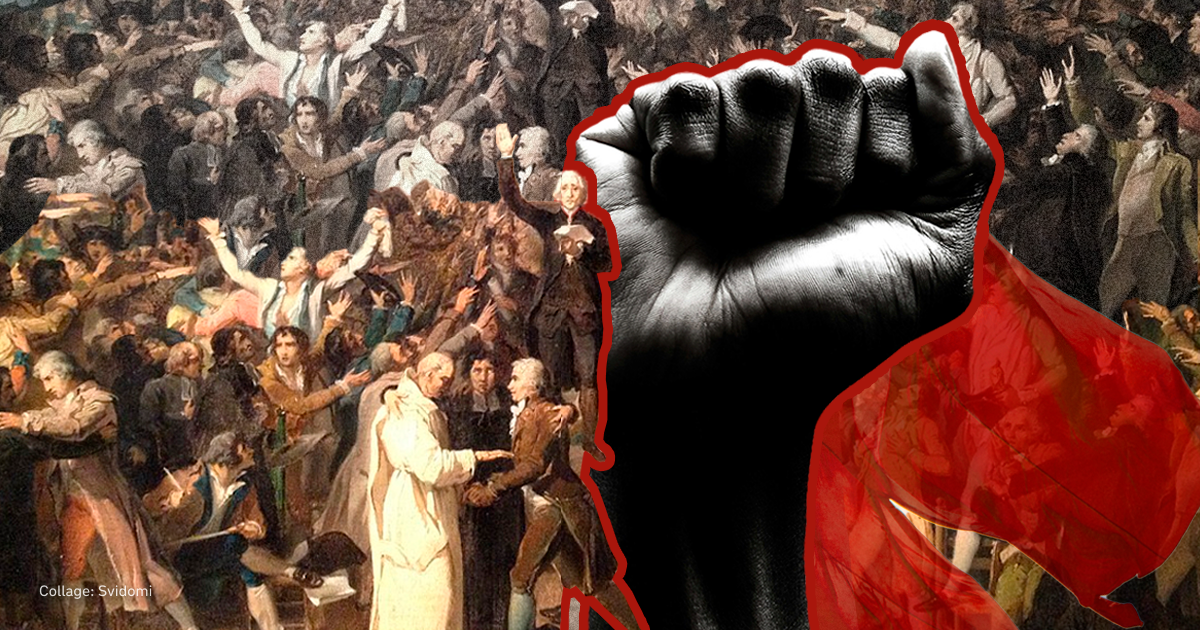
In today's political reality, left-wing parties and movements find themselves in different situations. While social and labour parties are in power in Spain and Sweden, in Ukraine, all communist ideology has been banned, and the ruling parties only partially use leftist rhetoric.
The Left faces many geopolitical challenges: the rise of authoritarian tendencies and regimes, armed conflicts and wars, economic recessions and labour market decline, and a downward trend in the protection of human rights.
Svidomi talks to historian and activist Vladyslav Starodubtsev about the current situation of left-wing political forces worldwide, the prospects for left-wing ideology in Ukraine, and who the supporters of left-wing movements are targeting.
Who are the "leftists"?
Left-wing political movements and organisations are committed to a policy of social equality and the provision of equal opportunities and material benefits to all members of society.
Ukrainian historian Vladyslav Starodubtsev says that modern left-wing organisations are united around the ideas of egalitarianism (the organisation of relations based on equal economic status – ed.), social justice and the concept of utilitarianism (the political morality of the state, with the action being that which creates the greatest happiness for the greatest number of members of society — ed.). All social democratic, green and communist parties can be classified as left-wing. Authoritarian regimes such as China, North Korea and Cuba are also left-wing.
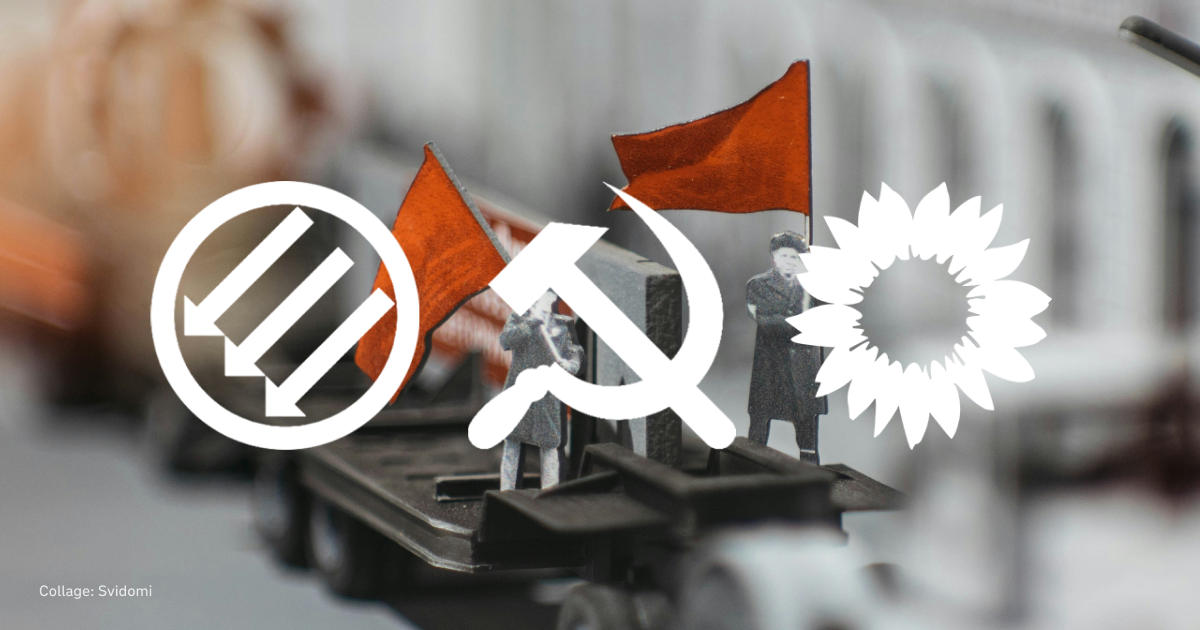
Today, populist tendencies and rhetoric dominate the left — they appeal to ordinary people and create anti-democratic propaganda, so you can find anti-immigrant rhetoric that contradicts the idea of social equality.
Such movements often have pro-Russian sentiments and are committed to Putin or the Cuban regime, says historian Starodubtsev. He cites the example of German politician Sahra Wagenknecht, who left the Left Party and announced the creation of her own party, which also shares left-wing views. She is against supplying arms to Ukraine and favours lifting sanctions on Russian energy resources.
"There are new approaches to the left — those that try to rethink the twentieth-century experience (the spread of communist ideology and the dominance of communist regimes – ed.) These are social-democratic, green and socialist parties, such as the Finnish Left Alliance or the Polish Razem. They value democratic values, take the environment and LGBTQ+ rights seriously," explains Vladyslav Starodubtsev.
Social democratic parties tend to be pro-European, especially among Western European countries: The Swedish Social Democratic Party and the Spanish Socialist Workers' Party. They advocate for protecting workers' rights and social guarantees for nationals and migrants.
However, the tendency to radicalise the movement and turn to populism dominates. For example, German intelligence notes the growing number of anarchist and radical communist movements and communities in Germany. They "exploit democratic discourse and radicalise public debate".
Because of this, the "leftists" have received a negative connotation in public discourse. Vladyslav Starodubtsev says that the name "leftists" has a negative connotation, regardless of whether the party is an activist of the leftist movement or not. It mainly describes supporters of socialism, Marxism, and communism.
"In Ukraine, there is no left-wing political actor now, so people are looking to the former communist or socialist parties, which have left a negative connotation,"
he says.
In English, they are called "tankies" - supporters of communist authoritarian regimes, those who express pro-Russian views. The word comes from the times when the USSR used the army to suppress protests in the Warsaw Pact countries (Albania, Bulgaria, Czechoslovakia, East Germany, Poland, Romania, Hungary and Poland - ed.) At that time, supporters of the pro-Soviet position and those who defended the Soviet use of tanks were called "tankies".
Activists, politicians, and intellectuals who publicly promote the left-wing movement and left-wing ideologies also contribute to the perception of the left-wing movement and left-wing ideologies. Well-known left-wing activists include environmental activist Greta Thunberg, who advocates left-wing environmental policies. Congresswoman Alexandria Ocasio-Cortez and Senator Bernie Sanders promote left-wing ideas in US politics. For example, they support the right to abortion and affordable healthcare for everybody.
"Well-known left-wing politicians and activists have a huge impact on the entire movement and responsibility, including their position on Ukraine,"
says Starodubtsev.
He cites the example of an open letter to the administration of US President Joe Biden, which was signed by members of Congress in October 2022, including Alexandria Ocasio-Cortez. The signatories demanded resolving the war, negotiating directly with Russia and easing sanctions against it to stabilise the world economy and prevent a "global hunger crisis" in poor regions of the world.
After the publicity, the letter was withdrawn. Democratic Congresswoman Sarah Jacobs said she "signed this letter on June 30, but a lot has changed. I wouldn't sign it today."
How and why do young people join left-wing movements?
Access to information forces political movements to seek new audiences among young people and even underage students who are not yet eligible to vote. They are, therefore, politicised and become active participants in the political process at an early age, especially in democratic countries.
Radicalisation is also the reason why young people are looking for organisations and parties to support and express their preferences.

"They are not satisfied with the current parties and organisations in power. Youthful maximalism, disillusionment, and aesthetic communism attract young people," explains historian Vladyslav Starodubtsev.
Among the English-speaking audience, communism and socialism are gaining in popularity. According to the Pew Research Centre, 69% of residents of EU member states are dissatisfied with the EU's democratic institutions. The Centre's analysts believe this is one of the reasons why society turns to radical ideas and movements.
Another reason is that Western countries that did not suffer from the direct influence of the USSR find these ideologies more acceptable, Starodubtsev believes.
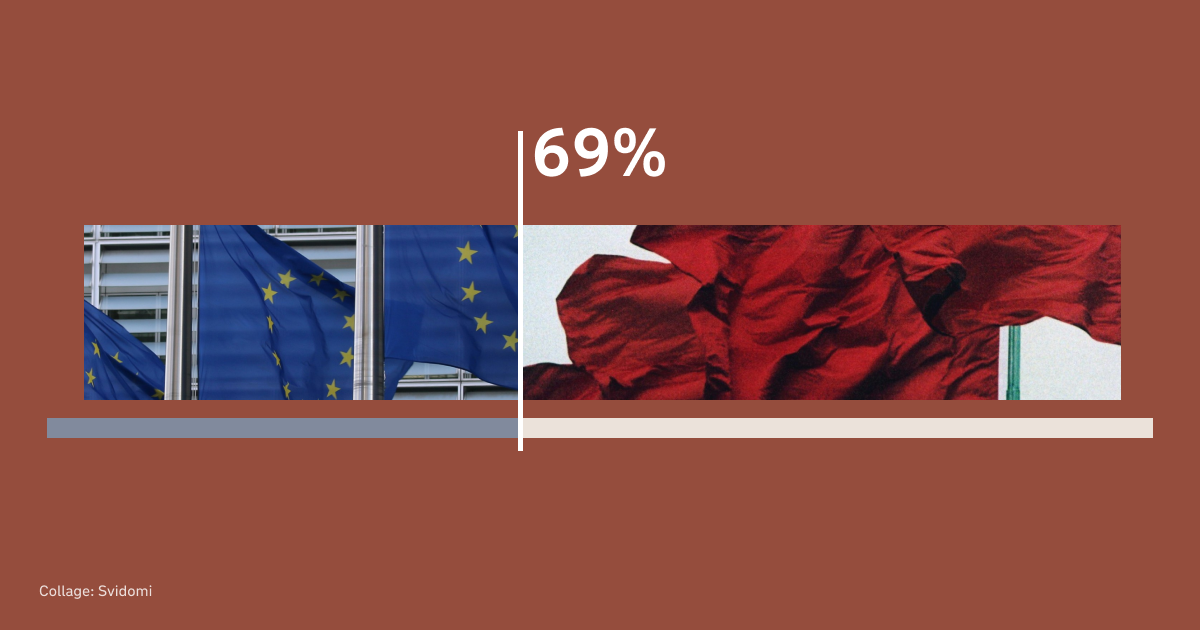
"Ukraine is now ahead of the world in the politics of memory. What Ukraine went through during the Second World War and the Soviet regime (the Holodomor, mass deportations in 1944-1951, repression of Ukrainian artists and politicians who opposed the Soviet regime, etc. Ukraine creates an opportunity to discuss previously taboo topics," says Starodubtsev.
At the same time, the historian does not perceive the growing trend towards communism among young people as a consequence of Chinese propaganda. "China is more concerned about what people think about the situation of the Uyghurs (a Turkic-speaking people who China enslaved - ed.) and China's genocide against them than how many people will consider themselves communists and wave red flags," he explains.
Read more about the situation of the Uyghurs and China's policy in Svidomi's article "Ukraine is not ready to recognise the Uyghur genocide, even though it is trying to get the Holodomor recognised as genocide" by Artur Kharytonov.
In 2022, the United Nations accused the People's Republic of China of discriminating against the Uyghurs by origin and religion and organising concentration camps. China denied the accusations, calling them "lies".
And yet, Russia and China are trying to influence left-wing political movements around the world. As an example, the historian cites the international organisation Progressive International, which brings together progressive left-wing organisations and activists — it has over 60 members — such as the American women's organisation Codepink, the Slovenian democratic social party Levica, and the French NGO ReAct, which works on the issue of employee equality.
But in 2022, its members began to leave the organisation. For example, the Polish party Razem withdrew due to "the lack of a declaration recognising Ukraine's sovereignty and condemning Russian imperialism".
Taras Bilous, a Ukrainian historian, co-editor of the left-wing journal Spilne (Commons) and a member of the Armed Forces, criticised the Progressive International's call for an end to NATO's "expansionism" and the implementation of the Minsk agreements (an agreement on a temporary truce in the war in eastern Ukraine, concluded at the negotiations in Minsk on September 5, 2014 between the OSCE, Ukraine and the occupation regimes of the illegal armed groups of the "L/DPR" controlled by Russia - ed.).
Starodubtsev says that some members and organisers of the Progressive International (PI) work with China and Russia. For example, the Codepink organisation, a member of the Progressive International, launched an information campaign in the United States in 2020 called "China is not our enemy". It is funded by American millionaire Neville Roy Singham, who is affiliated with the Chinese Communist Party.
In 2023, Singham created a network of social media blogs and media outlets through which he has spread propaganda of the Chinese communist government, disguising it as independent content.
Jill Stein, the Green Party's nominee for president of the United States in the 2012 and 2016 elections, though not a member of PI, also cooperated with Russia. In 2015, she visited the Kremlin and attended a gala dinner on the 10th anniversary of the founding of the Russian propaganda state media network Russia Today.
In 2017, the US House of Representatives Intelligence Committee launched an investigation into Stein and found that Russia had funded her campaign.
"Russia's huge role is to create narratives. And then these narratives and disinformation are spread by activists,"
Starodubtsev explains.
The 'left' in Ukraine
The memory of the Soviet regime has effectively discredited left-wing ideology in Ukraine.
After the collapse of the Soviet Union, new parties with a left-wing ideology were formed in Ukraine, and the Communist Party was reformatted. It became the largest faction in the Verkhovna Rada, winning 85 out of 450 constituencies in the 1994 parliamentary elections.
However, 20 years later, the Ukrainian Ministry of Justice issued an order that the Communist Party could not participate in elections, citing the law on the condemnation of communist and national socialist (Nazi) totalitarian regimes and the prohibition of propaganda using their symbols. In 2024, the Security Service of Ukraine put former Communist Party leader Petro Symonenko on the wanted list. The Security Service suspects Petro Symonenko of "calling for the overthrow of state power and justifying Russian aggression".
The Socialist Party, banned in 2022, can also be considered a party with a left-wing ideology. Formed in 1991, the party was already in opposition in 1994, and during the Orange Revolution (protests in 2004 against the falsification of the presidential election in favour of Viktor Yanukovych, whose opponent was Viktor Yushchenko – ed.) leading to electing Viktor Yushchenko the President.
In 2006, the party merged with the then-opposition Party of Regions (a pro-Russian party of the former president, who was banned in Ukraine and defended the rights of Russians and Russian speakers in Ukraine; the party ceased to exist in 2014 after its chairman and then president fled to Russia following mass protests – ed.) headed by Viktor Yanukovych.
The Socialist Party has not been represented in parliament since 2012.
Currently, no parties have a clear left-wing ideology in the Ukrainian parliament. President Volodymyr Zelenskyy's Party Servant of the People (Sluha Narodu) and Voice (Holos) declare liberal and centrist views. At the same time, the party of former President Petro Poroshenko in 2014-2019, European Solidarity (Yevropeiska Solidarnist), is centre-right, advocating European integration, open market and economic deregulation.
Civil society organisations and media, such as the Social Movement organisation or the journal Commons, mainly form left-wing movements in Ukraine. They claim to be the "new left" and advocate de-oligarchisation, democratic socialism and anti-capitalism.
However, they have not developed into political parties, partly because the communist parties have discredited the movement and partly because certain social policy items are in the programmes of the current parties, such as restrictions on the land market, pension increases and social security.
Vladyslav Starodubtsev believes that Ukrainian left-wing movements need to move away from pro-Russian organisations and the Soviet past and start appealing to the historical context — the Ukrainian left in the late nineteenth and early twentieth centuries, activists and dissidents who advocated socialist and anarchist ideas.
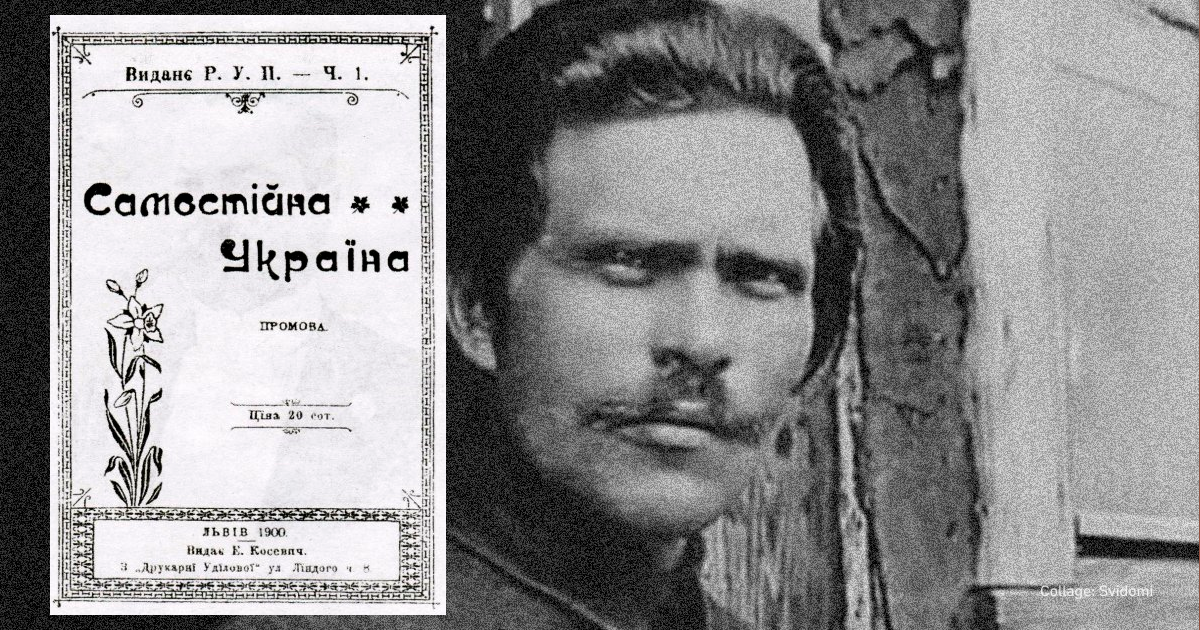
Among them was Nestor Makhno, a prominent activist of the Ukrainian Revolution of the early twentieth century, an anarchist politician, or the Revolutionary Ukrainian Party of 1900, whose members promoted the idea of an independent Ukraine.
How do foreign left-wing parties and movements support Ukraine?
Yet Ukraine is an essential part of the politics of contemporary left-wing parties, whether they support it or not. The Labour Party in the UK favours providing military assistance to Ukraine. The party condemned its former leader, Jeremy Corbyn, who called for a "truce and ceasefire".
Social Democratic and Green Parties in power in other European countries also support Ukraine, says Vladyslav Starodubtsev. "These are the German Greens, which advocate financial and military support for Ukraine. The Swedish Social Democratic Party, which has been in power in Sweden since 2014, is in favour of providing Ukraine with weapons. The Spanish Socialist Workers' Party also supports Ukraine and condemns Russia's military aggression.
However, not only pro-government moderate socialist parties support Ukraine. The Norwegian Red Communist Party and the Japanese Communist Party have condemned Russia's war against Ukraine, called for assistance to Ukraine and sanctions against Russia.
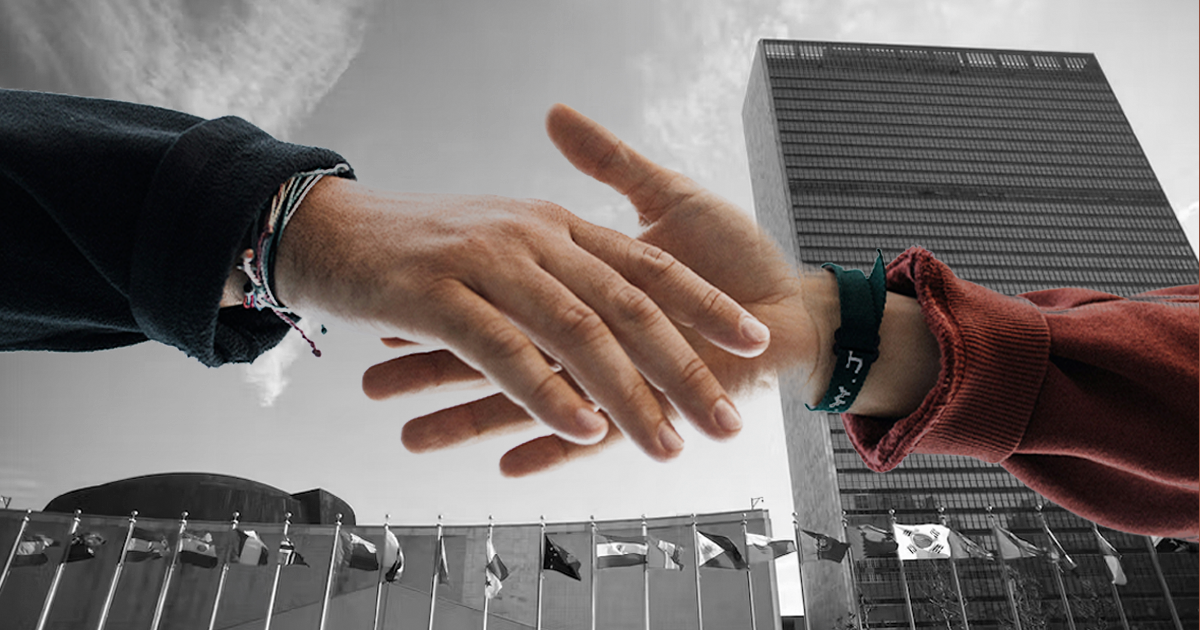
At the same time, there are left-wing parties that support Russia. For example, the Portuguese Communist Party accused Ukrainian President Volodymyr Zelenskyy of "anti-democratic sentiments" and "inciting war". The Communist Party of Chile accused NATO and the United States of "provocations" and "expansionist aspirations" that led to the "conflict in Ukraine".
"Ukraine is not supported by the remnants of the communist parties that were financed by the Soviet Union and still have links with Russia. But they are a minority,"
says historian Starodubtsev.
Left-wing ideology is changing. Some parties, such as the Swedish Social Democrats, the Spanish Socialists and the German Greens, are not perceived as left-wing, even though they are ideologically part of the movement.
Federico Trastulli, an Italian analyst at the Free International University of Social Sciences, believes that Western European social democratic parties, to stay in power in their countries, are broadening their electoral base and are therefore beginning to lean towards centrist policies so that their voters no longer perceive them as representatives of the left. On economic issues, however, these parties remain committed to left-wing ideology: they advocate protecting workers' rights, high taxes on high incomes and social protection for all citizens in the countries where they are fighting for power.
In Ukraine, however, left-wing parties and movements are on the fringes of the political process, with minimal influence and a negative opinion of themselves. But suppose left-wing parties in Europe are changing their programmes for the sake of power. In that case, left-wing movements in Ukraine will have to completely change the narrative about themselves and their ideology in general. Time will tell if this is possible.


